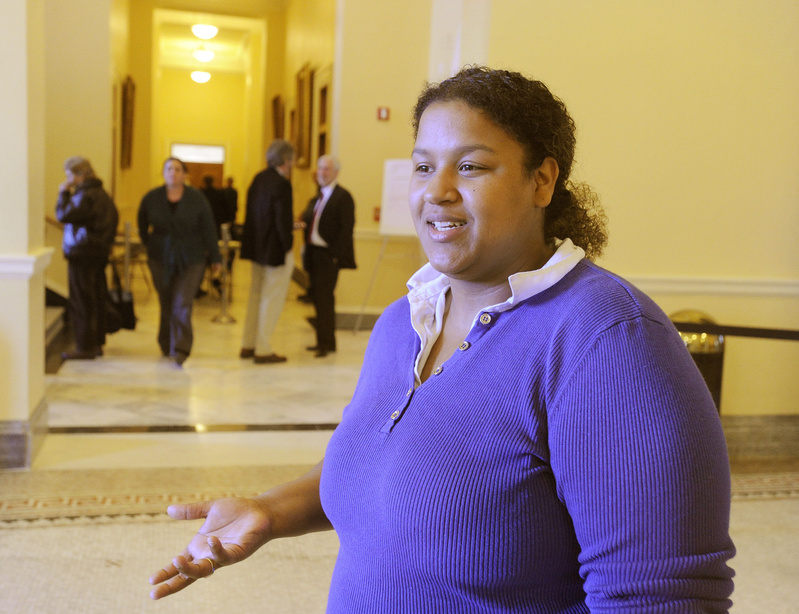AUGUSTA — Dan Nichols has multiple sclerosis and is worried that his home, the Portland Center for Assisted Living, will be closed next year.
Nichols, 58, told an attentive group of lawmakers Wednesday that he never thought he would have to live at the center, but the progression of his disease took away his ability to get out of a wheelchair by himself. Now he’s one of 152 people who live at the center, nearly all of whom rely on Medicaid to pay for the service.
Gov. Paul LePage is proposing to end Medicaid funding for Mainers who live in such private non-medical institutions as part of a plan to close a budget deficit that’s projected to be $221 million over the next 18 months. About 6,000 people, many of them sick, elderly or disabled, would have to find new places to live as of July 1.
Nichols was among more than 500 people who came to the State House on Wednesday to oppose major changes that LePage has proposed to MaineCare, the state’s Medicaid program. About 140 testified before two legislative committees, while hundreds of others participated in a morning rally against the cuts.
Protesters packed the State House Hall of Flags, holding signs that said “Budgets are Moral Documents,” “Gov. LePage: Who’s worth saving?” and “No Healthcare = Murder.”
“We believe that a fundamental moral measure of any economy is how the most vulnerable are faring,” said the Rev. Jill Job Saxby, executive director of the Maine Council of Churches. “We cannot allow thousands of Mainers to lose health care coverage at a time when many are also struggling to put food on the table, find housing or just keep warm through the winter.”
Saxby and other religious leaders began a vigil at the State House on Wednesday that will continue through the conclusion of the committee hearings on Friday.
Next week, lawmakers will begin discussing the proposal at work sessions before forwarding a plan to the Legislature early next year.
The state Department of Health and Human Services faces a $221 million budget deficit for this fiscal year and the next, and the problem must be addressed now, said DHHS Commissioner Mary Mayhew.
“This is an extremely difficult day for all of us,” Mayhew told members of the Appropriations and Health and Human Services committees. “We readily acknowledge that these are some of the most difficult decisions that have faced the Maine Legislature in recent years.”
Mayhew said her department proposed ways to bridge the budget gap by looking for benefits that Maine offers but are not required by the federal government.
Officials looked at Maine’s enrollment and how much is spent per capita compared with national averages.
Maine provides health care for 35 percent more people per capita than the national average and spends hundreds of dollars more per person than what’s common in other states, according to information from the governor’s office.
“Maine’s safety net is fraying,” Mayhew testified. “We must put this program on a secure foundation to meet the needs of Maine’s most vulnerable and needy.”
The budget proposed by LePage would eliminate MaineCare coverage for 65,000 people, cutting services that include helping senior citizens pay for prescription drugs and providing podiatry, dentistry and chiropractic care.
Tyler Ingalls, 36, who has autism, said state shelters and a crisis house have been instrumental in helping him cope through the years.
“Please protect services to our most vulnerable citizens like myself and elders,” he wrote in testimony submitted to lawmakers. “Cuts like these don’t save money — they cause people who are stable to launch into emergencies costing our state far more money.”
Throughout the day, lawmakers heard testimony from people who use the services or have benefited from them in the past, advocates for children and the elderly, and people who run facilities that could lose funding or even be closed.
Bishop Richard Malone of the Roman Catholic Diocese of Portland said he has “deep concerns” about the families that would be affected by the cuts. In particular, he said, he is worried about the loss of some or all health insurance for 65,000 people.
“Eliminating health care coverage, including the elderly drug program, is a tremendously risky enterprise that will result in worsening health, and for some, given the complexity of their condition, will lead to a premature death,” he said. “Health care is a basic human right. It is no less essential than food, shelter and clothing.”
Portland Mayor Michael Brennan, a former state senator who served on the Health and Human Services Committee, said cutting state funds would increase costs for Maine cities and towns.
“It is without question that, should these cuts proceed, they will not only result in a cost shift to the local municipality and property tax base, but dramatically impact the quality of life for tens of thousands of Mainers and the communities they call home,” he said.
After seven hours of testimony, legislators remained at the State House on Wednesday evening in case anyone wanted to testify after work.
Sen. Roger Katz, R-Augusta, said it was a difficult day, but spending cuts must be made to the DHHS.
“It’s a heart-wrenching day,” he said. “There’s no question there’s great human need out there.”
Katz said lawmakers learned more about the cuts by listening to testimony, but it’s not an option to make cuts to other state agencies to balance the budget for health and human services.
“Maybe not all of the governor’s cuts are the exact right cuts, but we’ve got to strive to solve the problem within DHHS,” he said.
Democratic Sen. Margaret Craven of Lewiston said Democrats will not support LePage’s cuts.
“In my own heart, I feel the lack of regard for senior citizens, children and working moms and dads is shameful,” she said.
From her perspective, $200 million in tax cuts that were approved in the budget earlier this year should be rescinded to cover the DHHS deficit.
LePage did not attend Wednesday’s hearing. He was in Franklin County to meet with business leaders and residents during his 11th Capitol for a Day event.
His press secretary, Adrienne Bennett, said, “The governor has provided direction to the Legislature. It’s time for them to have a serious discussion about what we can afford.”
Sandy Keith, administrator of the Portland Center for Assisted Living, said in an interview that threats of reduced funding have been coming from the state for years. But questions now posed by the federal government about how Maine has been reimbursed for private non-medical institutions have her worried that this could be the time when her facility is closed.
“I’m devastated,” she said. “I think about it every waking moment. Some of (the residents) have been here for 10 years. This is their home.”
The Associated Press contributed to this report.
MaineToday Media State House Writer Susan Cover can be contacted at 620-7015 or at:
scover@mainetoday.com
Send questions/comments to the editors.





